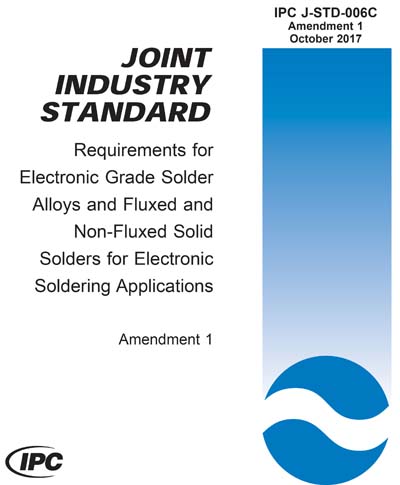Most recent
IPC J-STD-006C+AMD1-2017
Requirements for Electronic Grade Solder Alloys and Fluxed and Non-Fluxed Solid Solders for Electronic Soldering Applications + Amendment 1
This standard prescribes the nomenclature, requirements and test methods for electronic grade solder alloys; for fluxed and non-fluxed bar, ribbon, and powder solders, for electronic soldering applications; and for ''special'' electronic grade solders. This is a quality control standard and is not intended to relate directly to the material's performance in the manufacturing process. Solders for applications other than electronics should be procured using ASTM B-32. This standard is one of a set of three joint industry standards that prescribe the requirements and test methods for soldering materials for use in the electronics industry: IPC/EIA J-STD-004, Requirements for Soldering Fluxes; IPC/EIA J-STD-005, Requirements for Soldering Pastes; IPC J-STD-006, Requirements for Electronic Grade Solder Alloys and Fluxed and Non-Fluxed Solid Solders for Electronic Soldering Applications. The J-STD-006C-AM1 amendment provides better detail of a solder alloy's maximum allowed deviation about the nominal level of the element's mass than was provided in past alloy standards. The J-STD-006C-AM1 amendment provides information on negative effects of adding rare earth elements to specific, heavy tin-containing, lead-free solder alloys and propensity of tin whisker formation. Finally, the J-STD-006C-AM1 amendment inserted five new, patented lead-free solder alloys from 3 separate alloy suppliers for users of the J-STD-006C standard.
Association Connecting Electronics Industries [ipc]

